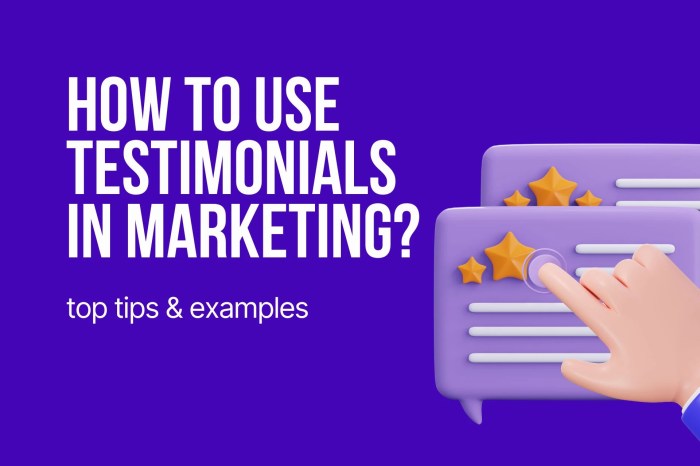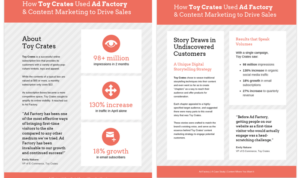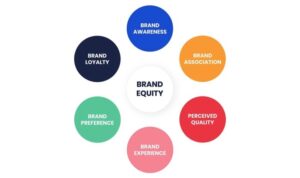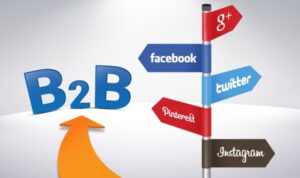Using Testimonials in Marketing sets the stage for this enthralling narrative, offering readers a glimpse into a story that is rich in detail with American high school hip style and brimming with originality from the outset.
When it comes to marketing, testimonials can be the secret sauce that elevates your brand to the next level. With the power of real customer experiences, testimonials have the potential to captivate audiences and drive conversions like never before.
Importance of Testimonials in Marketing
When it comes to marketing, testimonials are like the golden ticket to success, ya know what I mean? They’re like real-life proof that your product or service is legit and can actually deliver on its promises. Customers trust other customers, so when they see glowing testimonials from satisfied peeps, it builds mad credibility and trust. It’s like having your BFF vouch for you when you’re tryna make new friends.
Examples of Companies Using Testimonials Effectively
Let’s take a look at some top dogs in the game who are killing it with testimonials. Like Nike, they got peeps like LeBron James reppin’ their sneakers, and you know when LeBron says they’re fire, everyone’s gonna wanna cop a pair. Then there’s Apple, with customers raving about their products like they’re the second coming of sliced bread. These companies know that testimonials speak louder than any ad they could put out there.
How Testimonials Build Credibility and Trust
Testimonials are like the secret sauce that can take your marketing game to the next level. When potential customers see others just like them singing your praises, it’s like an instant trust boost. They feel more confident in making a purchase knowing that others have had a positive experience. It’s like having a whole squad of cheerleaders hyping you up before a big game. Testimonials build that solid foundation of trust that every brand craves.
Types of Testimonials

When it comes to testimonials in marketing, there are various types that businesses can utilize to showcase customer satisfaction and build credibility. Each type of testimonial has its own strengths and effectiveness in influencing consumer behavior.
Written Quotes
- Written quotes are a classic form of testimonials where customers provide feedback in written form.
- These testimonials can be displayed on websites, social media, or marketing materials to build trust with potential customers.
- They are easy to collect through follow-up emails, surveys, or feedback forms.
Video Testimonials
- Video testimonials add a personal touch and authenticity to customer feedback.
- They are highly engaging and can be shared on social media platforms, websites, and email campaigns.
- Video testimonials are more powerful in capturing emotions and building trust with the audience.
Case Studies
- Case studies provide a detailed account of a customer’s experience with a product or service.
- They offer in-depth insights into how the product or service solved a specific problem for the customer.
- Case studies are effective in showcasing real-life examples and success stories to potential customers.
Social Media Reviews
- Social media reviews are testimonials shared by customers on platforms like Facebook, Google, Yelp, or industry-specific review sites.
- These reviews are highly influential as they are easily accessible to a wide audience.
- Businesses can leverage positive social media reviews to build credibility and attract new customers.
Best Practices for Using Testimonials
When it comes to using testimonials in marketing, there are some best practices to keep in mind to maximize their impact and effectiveness.
Showcasing Testimonials
- Display testimonials prominently on your website, ideally on the homepage or landing pages where they can be easily seen by visitors.
- Utilize visuals like photos or videos of the customers providing testimonials to make them more engaging and relatable.
- Consider creating a dedicated testimonials page where potential customers can read through a variety of positive reviews.
Obtaining Permission
- Always ask for permission from customers before using their testimonials in marketing materials.
- Clearly explain how and where you plan to use their testimonial and ensure they are comfortable with it.
- Consider providing customers with a release form to sign, outlining the terms of use for their testimonial.
Importance of Authenticity and Transparency
- Ensure that testimonials are genuine and reflect real customer experiences to build trust with potential customers.
- Avoid editing testimonials to maintain their authenticity, but you can ask customers for permission to make minor adjustments for clarity.
- Be transparent about the source of the testimonials and provide context for when and how they were received.
Impact of Testimonials on Conversion Rates: Using Testimonials In Marketing

Testimonials play a crucial role in influencing potential customers to make a purchase. When people see positive feedback from others who have already tried a product or service, they are more likely to trust the brand and take action.
Increased Credibility and Trust, Using Testimonials in Marketing
- Testimonials provide social proof, showcasing that others have had a positive experience with the product or service, which builds trust with new customers.
- According to a survey by BrightLocal, 91% of consumers trust online reviews as much as personal recommendations.
- By including testimonials on product pages or in marketing materials, businesses can increase credibility and reassure potential customers.
Boost in Conversion Rates
- Research from Spiegel Research Center shows that displaying reviews can increase conversion rates by up to 270%.
- Testimonials act as persuasive content that addresses common objections or concerns that potential customers may have, ultimately leading to more conversions.
- By strategically placing testimonials throughout the buyer’s journey, businesses can guide prospects towards making a purchase decision.
A/B Testing for Optimization
- A/B testing testimonials involves experimenting with different testimonial formats, placements, or types to determine which ones are most effective in driving conversions.
- Businesses can test variables such as the length of testimonials, the inclusion of images or videos, or the positioning on a webpage to identify the optimal setup for maximizing conversion rates.
- By continuously testing and refining testimonials based on data-driven insights, companies can fine-tune their marketing strategies for optimal results.





